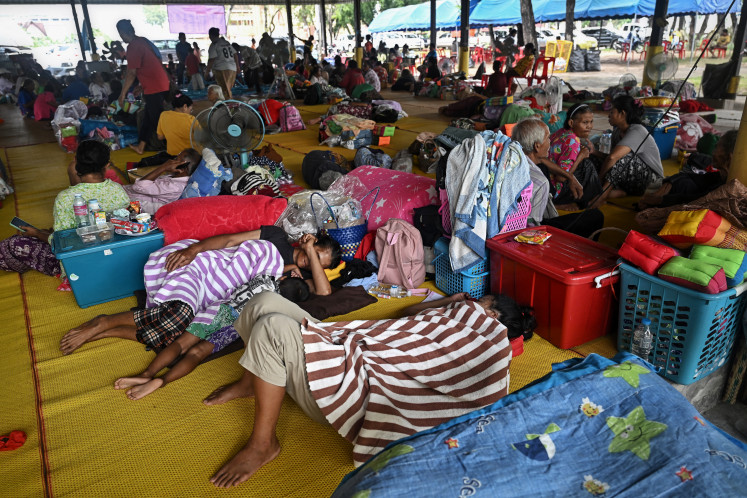Popular Reads
Top Results
Can't find what you're looking for?
View all search resultsPopular Reads
Top Results
Can't find what you're looking for?
View all search resultsElectronic transaction guide concerns younger industries
The implementation of a regulatory set overseeing electronic transactions and systems are expected to affect the fledgling e-commerce industry more than established industries such as banking and telecommunications, given the resource difference between the industries
Change text size
Gift Premium Articles
to Anyone
T
he implementation of a regulatory set overseeing electronic transactions and systems are expected to affect the fledgling e-commerce industry more than established industries such as banking and telecommunications, given the resource difference between the industries.
The Communications and Information Ministry is currently drafting key technical guidelines (RPM) on the implementation of a government decree on the provision of services related to electronic transactions and systems (PP PTSE), which received presidential approval in October 2012.
According to Ashwin Sasongko, a director general at the ministry, it aims to start the implementation of the guideline this year.
'The ministry, however, will give service providers up to 2015 to do the necessary arrangements to fully comply with the regulations,' he said. He added that the guidelines, in addition to the decree, would only apply to service providers that had business entities registered in Indonesia.
Meanwhile, service providers are most concerned about sections in the guidelines that spell out the terms and conditions under which they are required to store their data on domestic data centers and data recovery centers (DRC).
The decree already states that service providers that 'provide public services' are obliged to store their digital data in local data centers.
The technical guidelines, service providers expect, will further delineate the definition of 'public services' and hence, businesses which the rule would apply to.
Ashwin added that the government expected companies to store their data at local data centers to ease data collection in the case of a crime. However, he noted that the ministry had considered an exit policy that would exempt certain businesses from having to store their data domestically.
'But we have made sure that the terms of the exit policy are strict,' he said.
Daniel Tumiwa, the chairman of the Indonesian E-Commerce Association (idEA), said that besides the content of the guidelines, the e-commerce industry was also concerned with the speed at which the ministry passed the guidelines.
'We want the guidelines to be passed faster than the planned schedule because waiting for six-12 months [for clarity] is a long time,' he said. He added that businesses needed certainty soon because regulatory conditions affected future investment calculations.
'We need surety because we need to make business calculations and know what requirements we should meet to maintain our businesses,' he said.
He added that several e-commerce businesses still placed their data abroad, owing to cost factors.
'Storing data in local data centers could cost twice storing them overseas due to the architecture of Indonesia's Internet connections,' he said. Yet, although the e-commerce industry is acutely concerned over the guidelines, other sectors come off better adjusted to meet future regulatory requirements.
Adrian Prasanto, the spokesperson for PT Indosat (ISAT), said the company had stored their data related to electronic transactions at their own data centers located within the country.
Indosat, a cell phone operator, provides mobile wallet services, called Dompetku, which enables subscribers to transfer funds between mobile wallet accounts. The service currently has 25,000 active users.
'We store data from our mobile wallet services at our own data centers,' he told The Jakarta Post.
Similarly, Bianto Surodjo, the head of retail liability, wealth management and e-banking at Permata Bank, said the bank stored data from their e-banking services at their own data centers located within
the country.
'We view the regulation issued by the ministry, in addition to Bank of Indonesia, in a positive light because the regulation basically aims to grant protection to banking clients,' he said.
Permata Bank currently had roughly 500,000 clients utilizing mobile and Internet-based e-banking services.
'One of the most popular features is the real-time online transfer, which clients can do over their mobile handsets and the Internet,' he said.
'JP/Mariel Grazella










